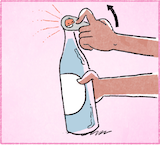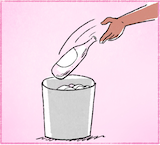





นี้คืออี่หยัง อันนี้เป็นขวดน้ำ ขวดน้ำเต็มขวดเอาโลด
ขวดน้ำกะเป็นแก้ว แก้วกะสีใสๆ
ในขวดนั้นกะมีน้ำพ้อม น้ำกะน้ำสีฟ้าๆ
ขวดน้ำกะมีฝาพ้อม ฝาขวดน้ำกะสีส้มๆ
ขวดน้ำมีจักขวด ขวดน้ำมีขวดเดียว มีขวดเดียวข้อหล้อ
7
เขากำลังเฮ็ดหญัง เขากำลังเปิดฝาขวดน้ำ เขากำลังเอาแนวเปิดฝาขวดน้ำงัดฝาขวดน้ำขึ้น
เขาเปิดฝาขวดน้ำเฮ็ดหญัง เขาอาดสิหิวน้ำ หลืออาดสิกินน้ำในขวดนี้ เขากะเลยเปิดฝาขวดน้ำออก
8
นี้คืออี่หยัง อันนี้เป็นแก้วน้ำ
เป็นโจกน้ำนั้นหละ เอาไว้ถ้าใส่น้ำ หลือว่าเอาไว้ใส่สิ่งต่างๆ ที่มันเป็นน้ำ แล้วเอาไว้ถ้ากิน
แก้วน้ำอันใหญ่บ่ โจกอันใหญ่บ่ บ่ กะอันบ่ใหญ่ปานใด กะอันพอดีนี้หละ อันพอเท่าๆ
9
เขากำลังเฮ็ดอี่หยัง เขากำลังเทน้ำ เขากำลังเทน้ำใส่แก้ว
มือหนึ่งของเขากำลังจับขวดน้ำ แล้วกะลินน้ำหลือว่าเทน้ำใส่แก้วน้ำ
เขาเทน้ำเฮ็ดหญัง เขากะอาดสิเอาน้ำนี้ไปกิน หลือว่าสิกินน้ำ เขากะเลยเทน้ำใส่แก้ว แล้วกะสิเอาไปกิน
10
เขากำลังเฮ็ดหญัง เขากำลังกินน้ำ พุซายคนนี้เขากำลังกินน้ำ
เป็นหญังเขาคือกินน้ำ จักคือกัน เขาอาดสิหิวน้ำ เขากะเลยกินน้ำกะได้
แล้วเขากินน้ำจั่งใด เขากินน้ำในแก้ว เขาอาดสิเทน้ำในขวดแล้วมาใส่แก้วนี้ แล้วเขากะจับแก้วน้ำนี้มากิน
เขากินน้ำหลายบ่ จัก จักคือกัน จักว่าเขากินหน้อยกินหลาย บ่ฮู้นำเขา
11
เขากำลังเฮ็ดหญัง เขากำลังดึกขวดถิ้ม
เขาดึกขวดถิ้มเฮ็ดหญัง เขาอาดสิบ่ใซ้งานขวดนี้แล้ว หลือว่าขวดน้ำนี้มันเบิดปะโยดแล้ว เขากะเลยสิเอาขวดน้ำนี้ถิ้ม หลือว่าขวดนี้มันอาดสิเป็นขะยะแล้ว เขากะเลยเอาไปถิ้มถังขะยะ
เขาเอาถิ้มจั่งใด เขากะอาดสิจับขวดน้ำมาแล้ว เขากะโญนหลือว่าดึกใส่ถังขะยะ
แล้วเขาโญนแฮงบ่ จักว่าโญนแฮงโญนค่อย กะอาดสิโญนค่อยๆ กะได้ เพาะว่ามันเป็นแก้ว มันเป็นขวด โญนแฮงบ่ได้ ขั้นโญนแฮงมันกะสิแตก ขั้นโญนค่อยๆ มันกะสิบ่แตก เพาะสะนั้นแล้ว เขากะอาดสิโญนค่อยๆ กะได้
Link to overview page
Link to dictionary
| Isaan | Pronunciation | Tones | Thai | English/Notes |
|---|---|---|---|---|
| นี้ | ni: | HF | นี้ | 1. this 2. here |
| คือ | khʉ: | HR | คือ | 1. to be, to resemble, like, as 2. why {บักหล้าคือบ่เก็บโต่ะแน่ = [addressing a young boy] Why haven't you cleared the table?} |
| อี่หยัง | i:-yaŋ | H-M | อะไร | 1. what {นี้คืออี่หยัง = What is this?} {มื้อนี้เจ้าเฮ็ดอี่หยัง = What are you doing today?} {กินเข้างายกับอี่หยัง = What did you have for breakfast?} 2. something, anything, (in negations) nothing {บ่ต้องเฮ็ดอี่หยังอีกเลยนอกจากใส่ปุย = [we] don't need to do anything besides adding fertilizer} |
| อัน | an | M | อัน | 1. thing, object 2. general clf. for objects |
| เป็น | pen | M | เป็น | 1. to be, to exist 2. to be able to 3. to suffer, sth. happens to 4. เป็นหญัง[...]คือ in initial position: why? {เป็นหญังเขากะคือแปงฟัน = Why is he brushing his teeth?} {เป็นหญังเคี่ยงบินมันคือสิตก = Why is the airplane falling down?} |
| ขวด | khu:at | LF | ขวด | bottle |
| น้ำ | na:m | HF | น้ำ | 1. water 2. drink, soft drink, juice |
| เต็ม | tem | M | เต็ม | full |
| เอาโลด | ao-lo:t | M-HF | เอาเลย, ทำเลย, จริงๆ | in final position: intensifier {โตส่ำกะทะเอาโลด = [a fish] as large as the pan!} {เกียบเต็มถ้วยเอาโลด = the bowl is almost full!} {ทะนาคานมันสิไปตั้งไว้อยู่ซู่หม้องเอาโลด = banks are everywhere!} |
| กะ | ga | M | ก็ | 1. then, consequently 2. also |
| แก้ว | gɛ:o | HF | แก้ว | glass {ขวดแก้ว = glass bottle} |
| สี | si: | M | สี | 1. color 2. colored pencil, crayon |
| ใส | sai | M | ใส | clear, transparent |
| ใน | nai | HR | ใน | in, within |
| นั้น | nan | HF | นั้น | that, there |
| มี | mi: | HR | มี | 1. to have 2. there is |
| พ้อม | phɔ:m | HF | พร้อม | at the same time, also, too {มีตะเว็นพ้อม = the sun's out, too} {กะทะมีด้ามพ้อม = the pan has also a handle} |
| ฟ้า | fa: | HF | ฟ้า | 1. sky {เคี่ยงบินมันกำลังบินขึ้นฟ้า = the airplane is taking off into the sky} 2. color: blue |
| ฝา | fa: | M | ฝา | 1. lid {ฝากะปุก = lid of a jar/pot} 2. wall {ฝาบ้าน = wall (of a house) = กำแพงบ้าน} |
| ส้ม | som | LF | ส้ม | 1. fruit: orange 2. color: orange |
| จัก | jak | M | จัก | 1. answer to a question: [I] don't know, don't know exactly, [I'm] not sure {พุซายคนนี้เขาเถ้าไป่ จัก จักเถ้าหลือบ่เถ้า เบิ่งบ่ค่อยออก = Is this man here already old? I don't know. I can't see clearly whether he's old or not.} {เขาเว้ากันอยู่ใส จักคือกัน = Where are they talking? I don't know either.} 2. exact(ly), what exactly {จักต้มอี่หยังกะบ่ฮู้ = I don't know what (exactly) he is cooking} {บ่ลู้คือกันจักปาอี่หยัง = I don't know either what kind of fish this is} 3. how much/many? {ต้นไม้มีจักต้น = How many trees are there?} {ตอนนี้จักโมงแล้ว = What time is it now?} {มือของเฮานี้สิมีจักนิ้ว = How many fingers do our hands have?} 4. a bit, a little bit {จักหน่อย/จักหน่อยหนึ่ง = a bit, a little bit} |
| เดียว | di:ao | M | เดียว | only, alone, single |
| ข้อหล้อ | khɔ:-lɔ: | LF-LF | เท่านั้น, ขนาดนั้น, น้อยๆ | only {ต้นไม้มีต้นเดียว ต้นเดียวข้อหล้อ = there's one tree, only one tree} {มีบ้านหลังเดียวข้อหล้อ = there's only one house} |
| เขา | khao | M | เขา | personal pronoun: he, she |
| กำลัง | gam-laŋ | M-HR | กำลัง | auxiliary indicating continuous or progressive action |
| เฮ็ด | het | H | ทำ | to do, to make |
| หญัง | ɲaŋ | M | อะไร, เป็นหญัง = ทำไม | 1. what {เขากำลังเฮ็ดหญัง = What is he doing?} {ธูปเอาไว้เฮ็ดหญัง = What are incense sticks for?} 2. something, anything, (nothing) 3. เป็นหญัง[...]คือ in initial position: why {เป็นหญังเขาคือใส่บักพิกลงไปในกวยเตียว = Why is he putting chili in [his] noodle soup?} {เป็นหญังหน้าต่างมันคือเปิด = Why is the window open?} {เป็นหญังมันคือมีควนไฟ = Why is there smoke?} |
| เปิด | pə:t | M | เปิด | 1. to open {เปิดหน้าต่าง = to open the window} {เปิดปะตู = to open the door} 2. to start, to switch on {เปิดไฟ = to switch on the light} {เปิดแอ = to switch on the A/C} |
| เอา | ao | M | เอา | to take, to give {เขากำลังเอาก่องไปซั่ง = he's taking the boxes to weigh them} {หมอกำลังเอายาให้คนป่วยกิน = the doctor is giving medicine to the patient} {เอาไว้ถ้า = is for, is used for, has the purpose of} |
| แนว | nɛ:o | HR | 1. kind, sort, type 2. method, mode of action - and the corresponding tool or object, thing {แนวนุ่งห่ม = clothes, clothing} {แนวคม = sharp object [e.g., a pair of scissors]} {แนวถือ = handle} 3. clf. for words starting with แนว {กินแนวอันนั้น = กินแนวกินอันนั้น = to eat this food [which was talked about earlier]} |
|
| งัด | ŋat | H | งัด | 1. to pry (open), lever, lift 2. to pick up, pull out, fish out |
| ขึ้น | khʉn | LF | ขึ้น | 1. to go up, to increase 2. sun: to rise {ตะเว็นกำลังขึ้น = the sun is rising} 3. more 4. bus/train etc.: to get on, to board {พุโดยสานขึ้นลดไฟเบิดแล้ว = all passengers have boarded the train} |
| อาด | a:t | LF | อาจ | 1. might, may, will 2. likely |
| สิ | si | M | จะ | future tense auxiliary {เขากำลังสิตื่น = he's about to wake up} {สิไปตะหลาด = [I'm] going to the market} |
| หิว | hiu | M | หิว | hungry, to crave (food, water, sleep etc.) {หิวนอน = to be tired} {หิวน้ำ = to be thirsty} {หิวเข้า = to be hungry} |
| หลือ | lʉ: | M | หรือ | or |
| กิน | gin | M | กิน | to eat, to consume, to use |
| เลย | lə:i | HR | เลย | 1. futher on, beyond, past {เข็มน้อยเลยเลขสิบสองไป = the minute hand has passed number twelve} 2. too much 3. at all 4. definitively 5. completely, utterly |
| ออก | ɔ:k | LF | ออก | 1. to go out, to leave 2. out |
| โจก | jo:k | LF | แก้ว | cup, bowl |
| นั้นหละ | nan-la | HF-M | นั่นแหละ | auxiliary for emphasis at the end of a phrase |
| ไว้ถ้า | wai-tha: | HF-LF | usually in a positive statement or answer: is for, is used for, has the purpose of {กะทะมีไว้ถ้าทอด = a pan is for frying} {น้ำบักนาวมีไว้ถ้าปุงอาหาน = lime juice is used to season food} {ปากกามีไว้ถ้าเขียน = a pen is for writing} {กะเทียมเอาไว้ถ้าเฮ็ดแนวกิน = garlic is used to make food} {ขาเอาไว้ถ้าญ่าง = legs are for walking} {เกิบเอาไว้ถ้าใส่ = shoes are for wearing} Notes: see also ไว้ |
|
| ใส่ | sai | H | ใส่ | 1. to put something in/on {เขาใส่บักพิกในกวยเตียวหลาย = he's putting a lot of chili in his noodle soup} {เขาบีบยาสีฟันใส่แปงสีฟัน = he squeezes toothpaste on the toothbrush} {ก่องเอาไว้ใส่ของ = boxes are there to put stuff in} 2. to wear (clothes) {เขาใส่เสี้ยแขนญาว = he's wearing a long-sleeve} 3. directed at {เอิ้นใส่กัน = to call each other/to say to each other} {หมามันเห่าใส่แมว = the dog barks at the cat} {ล้องเพงใส่ไม = to sing into the microphone} {เขากำลังซี้มือไปใส่พุซาย = she's pointing at the man} |
| ว่า | wa: | H | ว่า | 1. that, as {คำว่า X = the word X} 2. to say |
| ไว้ | wai | HF | ไว้ | 1. to keep, to put, to place, to retain, to save, to reserve {เขาเอาหัวของเขาไว้ใส = Where does she put her head?} {หมาสิเลี้ยงไว้บ้าน = dogs are kept/raised in the house} {ไก่เลี้ยงไว้ในคอก = chicken are kept/raised in a coop} {หน้ามันบังไว้ = the face is covered/not visible} {เขาเอาโทละสับวางไว้หู = he holds the phone to his ear} 2. for {นาลิกาปุกมีไว้เฮ็ดหญัง = What is an alarm clock for?} {หม้อเอาไว้เฮ็ดแนวกิน = a pot is used to make food} {ก่องเอาไว้เฮ็ดหญัง ก่องเอาไว้ใส่ของ = What is the box for? It's for putting in stuff.} Notes: see also ไว้ถ้า |
| สิ่ง | siŋ | H | สิ่ง | thing, object |
| ต่างๆ | ta:ŋ-ta:ŋ | H-H | ต่างๆ | different, various |
| ที่ | thi: | H | ที่ | 1. that, which {คนที่ยืนอยู่ฝั่งขวา = the person which is standing on the right = the person standing on the right} {เว้าคำที่บ่สุพาบ = to speak words which are impolite = to speak impolitely} 2. for ordinal numbers {ที่สาม = third} |
| มัน | man | HR | มัน | it (also used to refer to people) |
| แล้ว | lɛ:o | HF | แล้ว | 1. finished 2. already 3. and then, and next (especially แล้วกะ) 4. auxiliary for past tense |
| ใหญ่ | ɲai | H | ใหญ่ | large, big |
| บ่ | bɔ: | H | ไม่ | 1. no, not 2. question particle, transforming a statement into a question Notes: spelling exception in line with common usage on social media |
| ปานใด | pa:n-dai | M-M | เท่าไหร่, มาก | 1. after negative: (not) very, (not) so much {บ่ใหญ่ปานใด = not so large, not very large} 2. how much, how many {เฮาบ่สามาดนับได้ว่ามันมีหลายปานใด = it's impossible to count how many there are} |
| พอดี | phɔ:-di: | HR-M | พอดี | 1. to fit well 2. appropriate, just enough, just right {กะจกบานบ่ใหญ่ กะจกบานพอดี = not a large window, just right} {พอดีมือของเฮา = just right for his hand} 3. just in time, at the right moment, just this moment {แล้วพุซายคนนี้กะญ่างมาพอดี = and the man has come just now} |
| นี้หละ | ni:-la | HF-M | นี่แหละ | auxiliary for emphasis at the end of a phrase |
| พอ | phɔ: | HR | พอ | 1. just when, just after, as soon as 2. enough, adequate |
| เท่า | thao | H | พอดี, ไม่ไหญ่มาก | 1. not too large, appropriate size {เคี่ยงพอเท่าๆ = appropriately/moderately sized device/machine} 2. this much, that much, however much {เท่านั้น เท่านี้ = that much, this much} |
| เท | the: | HR | เท | to pour {เทน้ำลงไปในแก้ว = to pour water into a glass} |
| มือ | mʉ: | HR | มือ | 1. hand 2. front leg/paw (e.g., of a cat) |
| หนึ่ง | nʉŋ | H | หนึ่ง | 1. one 2. after adjective: intensifier {บักคักหนึ่ง = very much} {อันบักใหญ่หนึ่ง = very large}, or attenuates the meaning {กะดาดมันแผ่นน้อยๆ หนึ่ง = the piece of paper is [relatively] small} |
| ของ | khɔ:ŋ | M | ของ | of, belonging to |
| จับ | jap | M | จับ | 1. to grasp, to hold {เขาจับมือกัน = they're holding hands} {เขายืนจับไอติมอยู่ = she's standing, holding an ice cream} 2. to catch, to arrest {จับพุล้าย = to arrest a criminal} |
| ลิน | lin | HR | เท | to pour (slowly) |
| ไป | pai | M | ไป | 1. to go 2. auxiliary indicating action extending into the future |
| พุซาย | phu-sa:i | H-HR | ผู้ชาย | man, male |
| คน | khon | HR | คน | person, people |
| คือกัน | khʉ:-gan | HR-M | เหมือนกัน | 1. also, likewise, similarly {ยินดีที่ได้ฮู้จักคือกันคับ = Nice to meet you too!} 2. in negative sentences: either {บ่ลู้คือกัน = I don't know either} {จักคือกัน = I don't know (either)} |
| ได้ | dai | HF | ได้ | 1. can 2. to get, to obtain 3. before verb: indicating past tense 4. บ่ได้ + verb: not |
| จั่งใด | jaŋ-dai | H-M | ยังไง, แบบไหน | how, in what manner {บักนาวมันมีลดซาดจั่งใด = Lime fruits have what kind of taste?} {เขาปิดแอจั่งใด = How is he switching off the A/C?} {เทียนใซ้จั่งใด = How's a candle used?} {สิใซ้จั่งใด = how is [it] used?} |
| มา | ma: | HR | มา | 1. to come 2. auxiliary expressing action towards the present or focal time {กะคุเฮ็ดมาจากอี่หยัง = What is the bucket made of?} {แล้วเขากะเก็บเงินจากพุนั้นมา = and then she takes the money of that person} |
| หลาย | la:i | M | เยอะ, มาก | many, much, very |
| หน้อย | nɔ:i | LF | น้อย | 1. a little/some 2. not long |
| ฮู้ | hu: | HF | รู้ | 1. to know 2. to understand Notes: equivalent to ลู้ |
| นำ | nam | HR | 1. at, in 2. with, together with {บ่สามาดถือไปนำได้ = [you] can't carry it around} {กินบักแตงโมนำเฮาบ่ = Will you eat watermelon with me?} 3. to lead, to accompany, to go with {เด็กน้อยญ่างไปนำแม่ = the daughter follows her mother} |
|
| ดึก | dʉk | M | ปา ขว้าง | to throw |
| ถิ้ม | thim | LF | ทิ้ง | 1. to leave, to abandon 2. to throw away, to discard 3. to drop, to let drop |
| ใซ้งาน | sai-ŋa:n | HF-HR | ใช้งาน | to use, to put to use |
| เบิด | bə:t/bət | LF/M | หมด | 1. completely, totally, entirely {เทิงเบิด = all of them} {เบิดมื้อเบิดค่ำ = [all] day and night} {ขั้นพุโดยสานลงลดไฟเบิดแล้ว [...] = when all passengers have disembarked […]} {เขากินเบิดบ่ = Has he eaten all of it?} 2. to be finished, to be exhausted, to come to an end, to have no more {โน่ดบุ่กแบ็ดเบิด = the notebook is out of battery/the notebook needs recharging} |
| ปะโยด | pa-yo:t | M-LF | ประโยชน์ | 1. benefit 2. useful |
| ขะยะ | kha-ya | M-M | ขยะ | garbage, waste, trash, rubbish |
| ถังขะยะ | thaŋ-kha-ya | M-M-M | ถังขยะ | trash can, bin |
| โญน | ɲo:n | HR | โยน | to throw, to toss {โญนลูกบอน = to throw a ball} |
| แฮง | hɛ:ŋ | HR | แรง | 1. strong {ลมกำลังพัดแฮงอยู่ = to wind is blowing strongly} 2. loud {เสียงแฮง = loud} 3. strength, power |
| ค่อย | khɔ:i | H | ค่อย | 1. soft, gentle 2. little by little, gradually |
| เพาะว่า | phɔ-wa: | H-H | เพราะว่า | because |
| ขั้น | khan | LF | เมื่อ | when, if |
| แตก | tɛ:k | LF | แตก | 1. to break, to shatter 2. to be broken, to be shattered 3. to sprout {เม็ดเข้าสิแตก = the rice seeds will sprout} 4. of sweat: to break {เหี่ยแตก = to sweat} |
| เพาะสะนั้นแล้ว | phɔ-sa-nan-lɛ:o | H-M-HF-HF | เพราะฉะนั้นแล้ว | therefore, for that reason, consequently Notes: pronunciation: also realized as เพาะฉะนั้น |